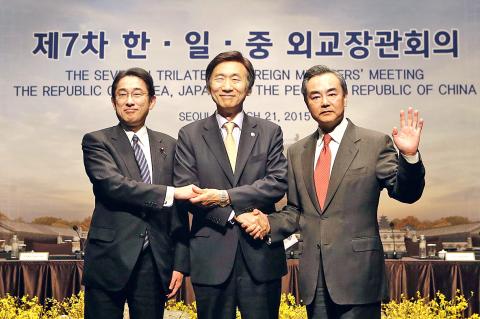The foreign ministers of South Korea, Japan and China yesterday agreed that a summit of their leaders on hold for nearly three years should be held soon to mend ties.
The ministers met in a bid to restore what had been a regular forum to discuss cooperation until it collapsed over what Seoul and Beijing saw as Tokyo’s reluctance to own up to its wartime past.
“Based on the accomplishments achieved through this meeting, the three ministers decided to continue their efforts to hold the trilateral summit at the earliest convenient time for the three countries,” a joint statement after the meeting said.

PHOTO: AFP
Chinese Minister of Foreign Affairs Wang Yi (王毅) said at a joint news conference that much depended on Japan proving that it is serious about recognizing its World War II actions in the region.
“The war has been over for 70 years, but the problem with history remains a present issue, not an issue of the past,” he said referring to the end of WWII.
South Korea and China see Japanese Prime Minister Shinzo Abe’s push to recast Japan’s war record in a less apologetic tone as an attempt to whitewash history, and have urged him to uphold former leaders’ statements of apology.
Abe has recently shown signs of softening his stance, helping to ease relations.
Meeting on the sidelines of the event earlier, Wang expressed hope that South Korea would join the China-led Asian Infrastructure Investment Bank, and South Korean Minister of Foreign Affairs Yun Byung-se said Seoul is reviewing its options, a South Korean official told reporters.
Japan-China ties remain frosty despite Abe having met Chinese President Xi Jinping (習近平) for the first time in November last year. South Korean President Park Geun-hye has yet to have a two-way summit with Abe.

AIR SUPPORT: The Ministry of National Defense thanked the US for the delivery, adding that it was an indicator of the White House’s commitment to the Taiwan Relations Act Deputy Minister of National Defense Po Horng-huei (柏鴻輝) and Representative to the US Alexander Yui on Friday attended a delivery ceremony for the first of Taiwan’s long-awaited 66 F-16C/D Block 70 jets at a Lockheed Martin Corp factory in Greenville, South Carolina. “We are so proud to be the global home of the F-16 and to support Taiwan’s air defense capabilities,” US Representative William Timmons wrote on X, alongside a photograph of Taiwanese and US officials at the event. The F-16C/D Block 70 jets Taiwan ordered have the same capabilities as aircraft that had been upgraded to F-16Vs. The batch of Lockheed Martin

US President Donald Trump yesterday announced sweeping "reciprocal tariffs" on US trading partners, including a 32 percent tax on goods from Taiwan that is set to take effect on Wednesday. At a Rose Garden event, Trump declared a 10 percent baseline tax on imports from all countries, with the White House saying it would take effect on Saturday. Countries with larger trade surpluses with the US would face higher duties beginning on Wednesday, including Taiwan (32 percent), China (34 percent), Japan (24 percent), South Korea (25 percent), Vietnam (46 percent) and Thailand (36 percent). Canada and Mexico, the two largest US trading

GRIDLOCK: The National Fire Agency’s Special Search and Rescue team is on standby to travel to the countries to help out with the rescue effort A powerful earthquake rocked Myanmar and neighboring Thailand yesterday, killing at least three people in Bangkok and burying dozens when a high-rise building under construction collapsed. Footage shared on social media from Myanmar’s second-largest city showed widespread destruction, raising fears that many were trapped under the rubble or killed. The magnitude 7.7 earthquake, with an epicenter near Mandalay in Myanmar, struck at midday and was followed by a strong magnitude 6.4 aftershock. The extent of death, injury and destruction — especially in Myanmar, which is embroiled in a civil war and where information is tightly controlled at the best of times —

China's military today said it began joint army, navy and rocket force exercises around Taiwan to "serve as a stern warning and powerful deterrent against Taiwanese independence," calling President William Lai (賴清德) a "parasite." The exercises come after Lai called Beijing a "foreign hostile force" last month. More than 10 Chinese military ships approached close to Taiwan's 24 nautical mile (44.4km) contiguous zone this morning and Taiwan sent its own warships to respond, two senior Taiwanese officials said. Taiwan has not yet detected any live fire by the Chinese military so far, one of the officials said. The drills took place after US Secretary